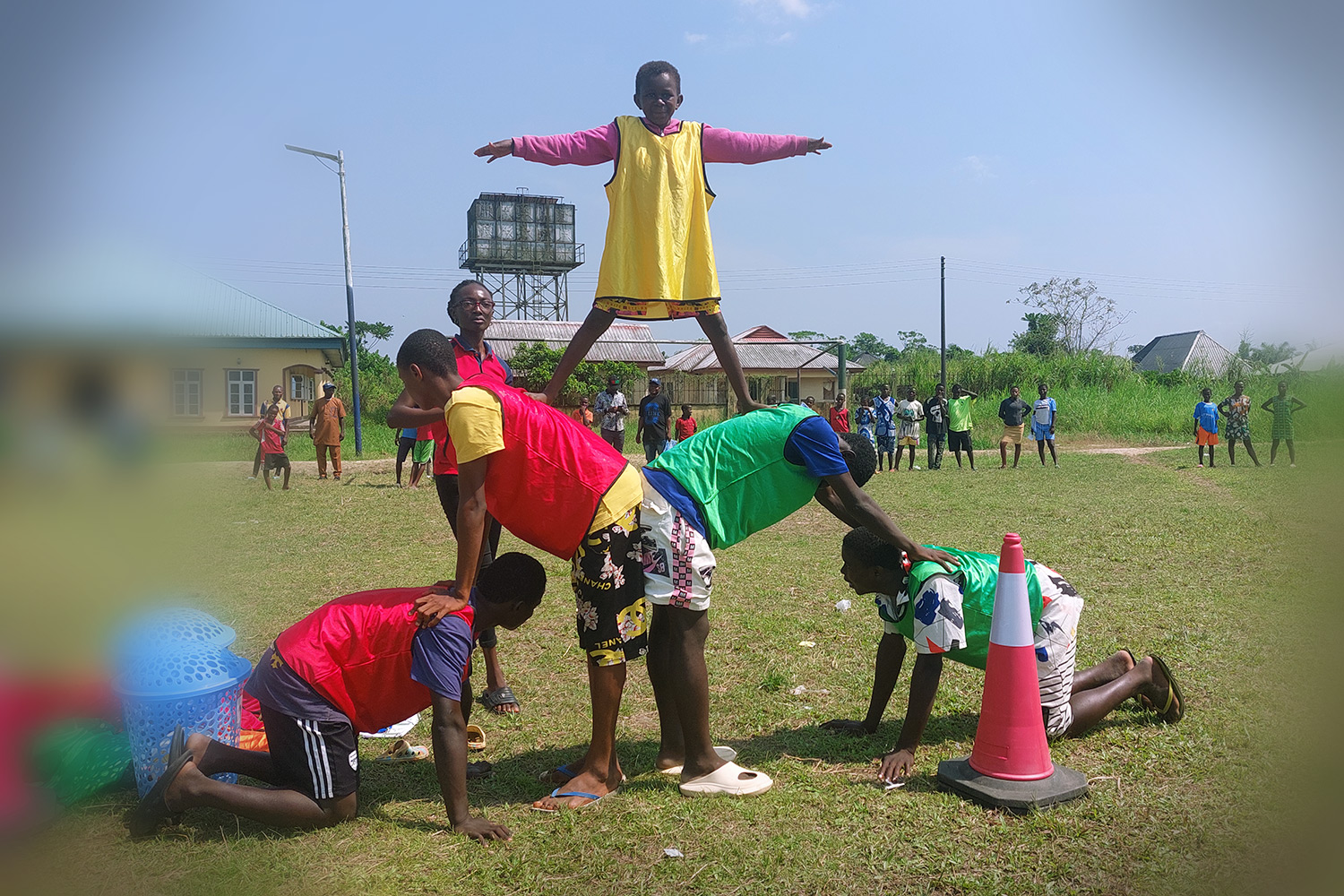
Youth in Nigeria participating in the LULU programme. © UNODC
Alice*, a 15-year-old living in a rural area in Nigeria, was struggling. Feeling lonely at home, subjected to punishment for the smallest of reasons, she had tried everything in an effort to cope. Running away from home. Cutting her wrists with a razor in a failed suicide attempt. Drinking alcohol. Taking too many sleeping pills.
Her drug use, once discovered by her father, threatened to further derail her young life, for he would delay paying her school fees, claiming her education had been a wasted investment. Cut off from her friends, Alice’s isolation deepened.
Eventually, Alice returned to school, where she was enrolled in the United Nations Office on Drugs and Crime (UNODC)’s “Line Up Live Up” (LULU) programme. LULU uses sports-based life skills training to empower youth and enhance their resilience to violence, crime, and drug use.
The programme struck a chord with Alice, who reported that the “LULU programme gave me a whole new meaning and understanding of life.” Alice recalled several lessons that stuck out for her during LULU, including one which required the students to run to the opposite side of the hall without being hit by balls flying from all directions. Each time the students were struck, they would have to start all over again.
Alice noted that at first, she was embarrassed each time a ball would hit her. It reminded her of the shame she had felt facing her friends after her father reported her drug use to the school. “I kept having to start all over again,” she said, but “I succeeded at the tail end and it taught me to never give up.”
Youth face many challenges that make them vulnerable to crime, violence, and victimization. Sports can offer vulnerable youth a sense of identity and belonging while also enhancing their physical and mental health and wellbeing. When used in an intentional, well-designed manner, sports can serve as a useful vehicle for cognitive, social, and emotional learning and key life skills. They can challenge harmful stereotypes and normative beliefs linked to violence and crime, including gender-based violence. Finally, sports can create safe spaces for young people and local communities to positively interact, promote tolerance, and contribute to building safe, just, and fair societies.
The UNODC Global Initiative on Youth Crime Prevention through Sport promotes the effective use of sport as a tool for addressing known risk and protective factors to youth violence and crime in order to reduce juvenile delinquency and offending and prevent drug use. It also supports the design and delivery of tailored sport-based interventions to prevent youth victimization and recruitment by organized criminal groups, including from gangs and violent extremist groups.
Alice’s principal attested to the transformation she witnessed among her students. “I thought that the LULU programme would be targeting drugs and academics,” she said. “Little did I know that this knowledge could be transferred to other, deeper personal and social life situations. The program digs for the biggest problems in the student’s lives and helps them solve them in their own ways.
Truly, I never imagined that sports could do this.”
*Name changed to protect privacy
The Line Up Live Up programme is currently being implemented with direct support by UNODC in Nigeria (Ekiti, Gombe, Kaduna, Sokoto, Borno and Bayelsa State), Mexico (Queretaro, Chiapas, and Mexico State), Colombia, and in Egypt, Lebanon, Libya, Palestine, and Sudan, benefiting over 5000 young people, boys, and girls in 2022. Tailored guidance tools for policy makers and practitioners on the prevention of violent extremism through sport have also been developed by UNODC and used to assist Member States efforts in this area.
Moreover, the “Sport against Crime: Outreach, Resilience, Empowerment of at-risk youth” (SC: ORE) programme, jointly developed by UNODC and the International Olympic Committee (IOC) in 2022, will support further the integration of sport in youth crime prevention and criminal justice frameworks with to prevent juvenile delinquency and reduce (re)offending.
“Sport against Crime: Outreach, Resilience, Empowerment of at-risk youth” (SC: ORE) (video)
“Leveraging Sport to Prevent Violent Extremism” (flyer)
“Youth Crime Prevention through Sport: Insights from the UNODC Line Up Live Up pilot programme” (report)
“Line Up Live Up”: Preventing youth crime and violence through sport” (video)